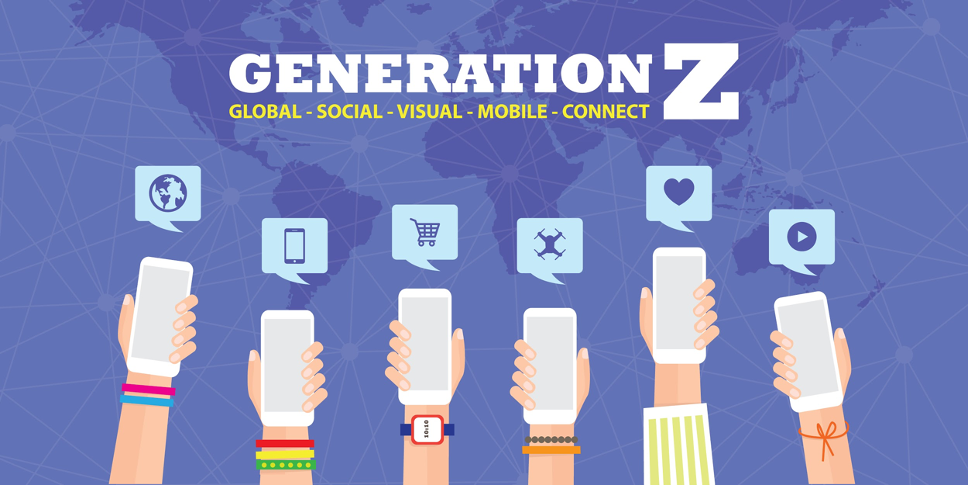
By Mark Garrison
After more than a decade of Millennial obsession, a new generation is stepping into the spotlight… Generation (Gen) Z.
GenZ is made up of people born in the late-90’s through mid-10’s (1997 to 2012/15ish). Soon this generation will represent 25% of the population, will be the most diverse generation so far, and will also be the largest consumer spending group. All of this means organizations need to sit up and take notice of GenZ to stay ahead of the curve.
To understand why GenZ is different, we need to look at what happened during their lifetime. For some of them, 9/11 was something they read about in history books; they don’t remember a time when there wasn’t a War on Terror; and the Global Pandemic is the first major world wide event they’ve experienced. To really put things into perspective, GenZ will be the first that has never known a world without the worldwide web. They were born into major technological advances and items like a floppy disk and a phone with a chord are foreign. They are, or will, start their careers in a world where technology and automation have eliminated many of the more manual or repetitive tasks, which used to be the core of entry-level positions. This has changed the modern-day workforce, which is shrinking and highly competitive.
GenZ is about to make its presence known in organizations in a major way. Check out these tips to help get your organization ready:
Organizational Alignment
GenZ prefers to work in industries and for companies that they might interact with or consume goods from personally, as opposed to industries in which they might not be a frequent consumer. Z’ers prefer more established organizations, unlike Millennials who were highly interested in startups and early-stage companies. They are looking for stable employment and will remain loyal to the company if that is offered. That doesn’t mean they are not entrepreneurial, but they are more likely to build side hustles alongside the safety of their stable job.
They want a work-life balance and are attracted to remote work, flexible hours, health care, unique perks, and engaging work. They tend to avoid jobs that have consistently boring tasks or feel “too analog.” You can find them drawn towards the tech industry, which is not surprising since they grew up with tech in their cribs and hands. Additionally, they’re drawn to work that supports the greater good, in industries such as healthcare and education.
Shifting Style Preferences
Organizations have shifted to a more team-centered approach based on the preferences of Millennials. Now they willl have to start moving again because, unlike the previous generation, GenZ prefers individual tasks over team-based activities. They want their independence but do not want isolation. GenZ favors a more personalized approach to “jobs” or roles. Instead of filling standardized positions, shift focus to people’s skillsets and tasks needing completion. They are great visual learners, if you can show them what you need to be done, they will get the job done extremely well and probably improved.
Putting Values First
GenZ is attracted to organizations whose values align with their own. A large number of Gen’Zers are even willing to take a lower salary with a company as such. Social purpose is probably the most critical value for this generation. They want to make sure their organizations are being good global citizens both in message and action. GenZ no longer forms opinions solely based on the quality of the products, services, or opportunities an organization offers, but now they also factor in their ethics, practices, and social impact.
Organizations need to highlight their efforts towards the “greater good.” Inclusion and diversity are also critical factors for attracting GenZ and if your leadership or organization looks homogenous, start changing your corporate culture.
Actions Moving Forward
As organizations move forward, it’s important to structure plans with a focus on robust training programs, leadership development, and corporate values. They’ll need to fundamentally change how they recruit and retain talent and make sure they offer mentorship programs, coaching, and some type of cross-team training. Organizations should also work on shifting from career ladders to a career lattice, where there is no longer just a hierarchy, but a woven path of diagonals allowing people to explore and grow skills in various parts of the organization.
If your organization has not already started planning for GenZ, it’s not too late, but it’s important to get the ball rolling. As the first rounds of GenZ are beginning to graduate and look for organizations to be a part of, you need to stand out to attract them!
For all your Generational Diversity needs, contact Coeus Creative Group for trainings, coaching, strategic planning, and more.
